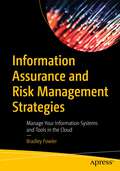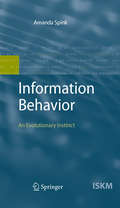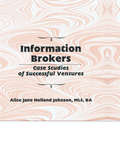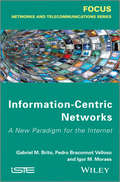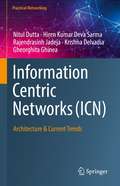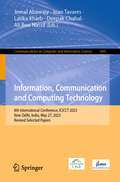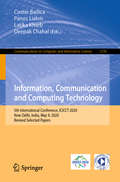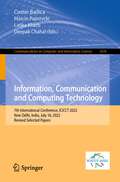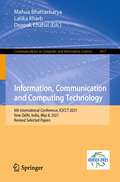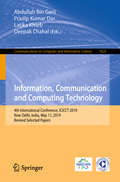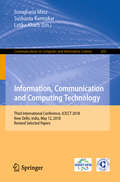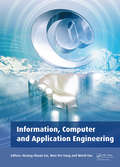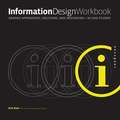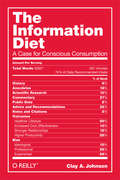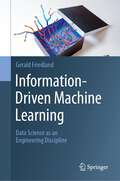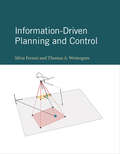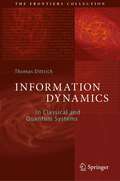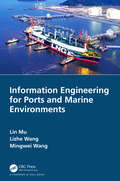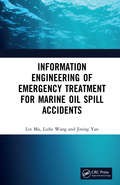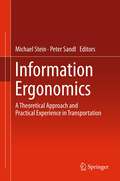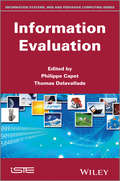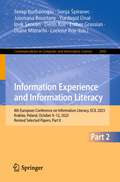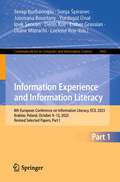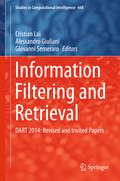- Table View
- List View
Information Assurance and Risk Management Strategies: Manage Your Information Systems and Tools in the Cloud
by Bradley FowlerLearn how to deploy information assurance risk management strategies that align with the National Institute of Standards and Technology’s recommendations. This book will show you how to implement information assurance risk management strategies within your organization. Aimed at system administrators and cybersecurity practitioners, author Bradley Fowler first walks you through how to assess known risks in your organization, understand why using a risk mitigation security strategy control profile is essential, and how to create one for your organization. You will then learn how to develop a risk factor table, outlining descriptions for each risk factor within your organization and which software applications you’ll need to rely on for daily business communication and operations. You will also see how to assess and categorize the level of risk within each technology tool, as well as the impact of an information security breach on the organization. As you progress through the book, you'll review privacy issues relating to your organization, develop and manage a privacy compliance risk profile, and develop and manage a privacy compliance control profile. Additionally, you will gain insight into creating a privacy compliance risk mitigation strategy that helps protect your organization even as security threats evolve. Take the first step to safeguarding your company’s highly valuable information assets today! What You'll Learn Understand what information assurance is and how it relates to risk management strategiesAssess, develop, implement, and manage risk management strategies for corporate information systems, technology, and cloud environmentsDevelop and utilize information usage profiles and risk factor tablesUnderstand the value of data encryption and usage of private and public key exchange for information assurance and security Who This Book Is For Information system and cloud architects responsible for developing, implementing, and managing corporate information systems and cloud environments.
Information Behavior
by Amanda SpinkInformation behavior has emerged as an important aspect of human life, however our knowledge and understanding of it is incomplete and underdeveloped scientifically. Research on the topic is largely contemporary in focus and has generally not incorporated results from other disciplines. In this monograph Spink provides a new understanding of information behavior by incorporating related findings, theories and models from social sciences, psychology and cognition. In her presentation, she argues that information behavior is an important instinctive sociocognitive ability that can only be fully understood with a highly interdisciplinary approach. The leitmotivs of her examination are three important research questions: First, what is the evolutionary, biological and developmental nature of information behavior? Second, what is the role of instinct versus environment in shaping information behavior? And, third, how have information behavior capabilities evolved and developed over time? Written for researchers in information science as well as social and cognitive sciences, Spink's controversial text lays the foundation for a new interdisciplinary theoretical perspective on information behavior that will not only provide a more holistic framework for this field but will also impact those sciences, and thus also open up many new research directions.
Information Brokers: Case Studies of Successful Ventures
by Alice J JohnsonThe perfect guide to jumpstart an information brokerage firm!Here is an instructive guide for any librarian planning to start an information brokerage, whether as an entrepreneur or as a member of a document delivery group in a library. The methods used by successful firms and librarians are gathered together in this helpful book. Information Brokers: Case Studies of Successful Ventures identifies specific skills and relevant characteristics required to establish a successful information brokerage firm, and provides a descriptive model to assist you in running an information brokerage firm as a viable business venture.This guide is full of information gleaned from questionnaires sent to successful information brokerages throughout the United States and from in-depth interviews conducted with the principals of six of these firms. During the interviews, these individuals were questioned about many relevant issues of the field including: establishment of the business company history what specifically made each business a success general concepts concerning information brokering pertinent literature that helped them, and can help youLibrarians looking for a career change or who find their jobs in jeopardy as a result of budget cuts may want to look into the field of information brokerage. With Information Brokers: Case Studies of Successful Ventures, you can discover if the information brokerage field is for you!
Information-Centric Networks: A New Paradigm for the Internet
by Gabriel M. de Brito Pedro B. Velloso Igor M. MoraesSince its inception, the Internet has evolved from a textual information system towards a multimedia information system, in which data, services and applications are consumed as content. Today, however, the main problem faced is that applications are now content-oriented but the protocol stack remains the same, based on the content location. Thus, it is clear that the Internet’s current architecture must change. This new architecture should take into account aspects to improve content location and delivery efficiency and also content availability. Fulfilling these requirements is the main goal of information-centric networks (ICNs). ICN is a new communication paradigm to increase the efficiency of content delivery and also content availability. In this new concept, the network infrastructure actively contributes to content caching and distribution. This book presents the basic concepts of ICNs, describes the main architecture proposals for these networks, and discusses the main challenges to their development. Information Centric-Networks looks at the current challenges for this concept, including: naming, routing and caching on the network-core elements, several aspects of content security, user privacy, and practical issues in implementing ICNs. Contents 1. Content Distribution on the Internet. 2. Information-Centric Networks. 3. Main ICN Architectures. 4. Challenges. 5. Practical Issues. About the Authors Gabriel M. Brito is an Engineer at Petrobras in Brazil and studying for a Master’s degree at the Universidade Federal Fluminense in Brazil. Pedro Braconnot Velloso is an Associate Professor in the Department of Computer Science at the Universidade Federal Fluminense (UFF), Brazil. He worked for Bell Labs France as a research engineer from 2009 to 2011. Igor M. Moraes is an Associate Professor at the Universidade Federal Fluminense in Brazil.
Information Centric Networks: Architecture & Current Trends (Practical Networking)
by Nitul Dutta Hiren Kumar Sarma Rajendrasinh Jadeja Krishna Delvadia Gheorghita GhineaThis book aimed at bringing an insight to the ICN network, particularly various architectures, issues and challenges in the new networking paradigm. The book starts with an introduction to the new promising concept of ICN and its origin along with the reason behind this interesting innovation. Different architectures proposed so far in support of implementing the ICN is also discussed in details. Few of the challenges of ICN implementation are enlisted as caching, naming, routing, and security. Each of these challenges with recent development is covered in individual chapters. Moreover, integration of current trends in communication and computing like software defined networking and machine learning approach are another area that this book is focusing. All these chapters highlight the recent developments reported in the area and also discusses the future trends. The book provides an overview of the recent developments in future internet technologies, bringing together the advancements that have been made in ICN. The book includes three unique chapters in the field of ICN research. The first, is the SDN framework for implementing ICN by decoupling data and control plan. The machine learning models for predicting future trends in network traffic and other management activities is another important chapter. This chapter includes the possibilities of using machine learning models for trend prediction to help network administrators and service providers to take care of unexpected sudden change traffic pattern and user behaviour. The third most vital chapter is the security issues in ICN. This chapter includes various facts that influences the security of ICN. Issues involved in naming, caching and routing are discussed separately along with few recent works in these areas. Various types of attacks in ICN are also part of the discussion. The stated book would be useful for researchers in this area and will work as a reference for future work. Moreover, the content of the book would also be suitable as a supporting material for undergraduate and graduate level courses in computer science and electrical engineering.
Information, Communication and Computing Technology: 8th International Conference, ICICCT 2023, New Delhi, India, May 27, 2023, Revised Selected Papers (Communications in Computer and Information Science #1841)
by Jemal Abawajy Joao Tavares Latika Kharb Deepak Chahal Ali Bou NassifThis book constitutes the refereed proceedings of the 8th International Conference on Information, Communication and Computing Technology, ICICCT 2023, held in New Delhi, India, during May 27, 2023.The 14 full papers included in this book were carefully reviewed and selected from 60 submissions. They were organized in topical sections as follows: global platform for researchers, scientists and practitioners from both academia and industry to present their research and development activities in all the aspects of Pattern Recognition and computational Intelligence techniques.
Information, Communication and Computing Technology: 5th International Conference, ICICCT 2020, New Delhi, India, May 9, 2020, Revised Selected Papers (Communications in Computer and Information Science #1170)
by Costin Badica Panos Liatsis Latika Kharb Deepak ChahalThis book constitutes the refereed proceedings of the 5th International Conference on Information, Communication and Computing Technology, ICICCT 2020, held in New Delhi, India*, in May 2020.The 24 full papers and one short paper presented in this volume were carefully reviewed and selected from 220 submissions. The papers are organized in topical sections on data communication & networking; advanced computing using machine learning.*The conference was held virutally due to the COVID-19 pandemic.
Information, Communication and Computing Technology: 7th International Conference, ICICCT 2022, New Delhi, India, July 16, 2022, Revised Selected Papers (Communications in Computer and Information Science #1670)
by Costin Badica Marcin Paprzycki Latika Kharb Deepak ChahalThis book constitutes proceedings of the 7th International Conference on Information, Communication and Computing Technology, ICICCT 2022, held in New Delhi, India, in July 2022.The 11 papers presented in this volume were carefully reviewed and selected from 65 submissions. The papers cover a great variety of topics, such as wireless networks, deep learning, machine learning, neural networks, natural language processing, sentiment analysis, network security, image processing, image augmentation and others. The contributions are divided into the following thematic blocks: Networking and Communication; Evolutionary Computing through Machine Learning.
Information, Communication and Computing Technology: 6th International Conference, ICICCT 2021, New Delhi, India, May 8, 2021, Revised Selected Papers (Communications in Computer and Information Science #1417)
by Mahua Bhattacharya Latika Kharb Deepak ChahalThis book constitutes the refereed proceedings of the 6th International Conference on Information, Communication and Computing Technology, ICICCT 2021, held in New Delhi, India, in May 2021.The 16 full papers and 4 short paper presented in this volume were carefully reviewed and selected from 83 qualified submissions. The papers are organized in topical sections on communication and network systems; computational intelligence techniques.
Information, Communication and Computing Technology: 4th International Conference, ICICCT 2019, New Delhi, India, May 11, 2019, Revised Selected Papers (Communications in Computer and Information Science #1025)
by Abdullah Bin Gani Pradip Kumar Das Latika Kharb Deepak ChahalThis book constitutes the refereed proceedings of the 4th International Conference on Information, Communication and Computing Technology, ICICCT 2019, held in New Delhi, India, in May 2019.The 23 full papers and one short paper presented in this volume were carefully reviewed and selected from 120 submissions. The papers are organized in topical sections on communication and network systems; and emerging computing technologies.
Information, Communication and Computing Technology: Third International Conference, ICICCT 2018, New Delhi, India, May 12, 2018, Revised Selected Papers (Communications in Computer and Information Science #835)
by Sonajharia Minz Sushanta Karmakar Latika KharbThis book constitutes the refereed proceedings of the Third International Conference on Information, Communication and Computing Technology, ICICCT 2018, held in New Delhi, India, in May 2018. The 18 revised full papers presented in this volume were carefully reviewed and selected from 295 submissions. The papers are organized in topical sections on communication and network systems and emerging computing technologies.
Information, Computer and Application Engineering: Proceedings of the International Conference on Information Technology and Computer Application Engineering (ITCAE 2014), Hong Kong, China, 10-11 December 2014 (Routledge Revivals)
by Hsiang-Chuan Liu Wen-Pei Sung Wenli YaoThis proceedings volume brings together peer-reviewed papers presented at the International Conference on Information Technology and Computer Application Engineering, held 10-11 December 2014, in Hong Kong, China. Specific topics under consideration include Computational Intelligence, Computer Science and its Applications, Intelligent Information Processing and Knowledge Engineering, Intelligent Networks and Instruments, Multimedia Signal Processing and Analysis, Intelligent Computer-Aided Design Systems and other related topics. This book provides readers a state-of-the-art survey of recent innovations and research worldwide in Information Technology and Computer Application Engineering, in so-doing furthering the development and growth of these research fields, strengthening international academic cooperation and communication, and promoting the fruitful exchange of research ideas. This volume will be of interest to professionals and academics alike, serving as a broad overview of the latest advances in the dynamic field of Information Technology and Computer Application Engineering.
Information Design Workbook: Graphic Approaches, Solutions, and Inspiration + 30 Case Studies
by Kim Baer<p>New in paperback, this workbook is a methodical yet comprehensive approach to conveying the fundamentals of avant-garde, innovative, information design by examining history, theory, criticism, technology and media, process, method, and practice. <p>Opening with a very brief history followed by an instructive breakdown of the discipline, readers get an intimate understanding of the complexities of crafting information design to effectively improve communication both functionally and aesthetically. The back half of the book contains a wide range of case studies from design firms around the world so designers can see the techniques previously outlined in the first half of the book. The author also critiques and explains why the design is successful in terms of formal quality (Aesthetics) and function (How does it improve communication?).</p>
The Information Diet
by Clay A. JohnsonThe modern human animal spends upwards of 11 hours out of every 24 in a state of constant consumption. Not eating, but gorging on information ceaselessly spewed from the screens and speakers we hold dear. Just as we have grown morbidly obese on sugar, fat, and flour--so, too, have we become gluttons for texts, instant messages, emails, RSS feeds, downloads, videos, status updates, and tweets. We're all battling a storm of distractions, buffeted with notifications and tempted by tasty tidbits of information. And just as too much junk food can lead to obesity, too much junk information can lead to cluelessness. The Information Diet shows you how to thrive in this information glut--what to look for, what to avoid, and how to be selective. In the process, author Clay Johnson explains the role information has played throughout history, and why following his prescribed diet is essential for everyone who strives to be smart, productive, and sane. In The Information Diet, you will: Discover why eminent scholars are worried about our state of attention and general intelligence Examine how today's media--Big Info--give us exactly what we want: content that confirms our beliefs Learn to take steps to develop data literacy, attention fitness, and a healthy sense of humor Become engaged in the economics of information by learning how to reward good information providers Just like a normal, healthy food diet, The Information Diet is not about consuming less--it's about finding a healthy balance that works for you
The Information Diet: A Case for Conscious Comsumption
by Clay A. JohnsonThis is a softcover version of the title released in 2011; there is no new material.The modern human animal spends upwards of 11 hours out of every 24 in a state of constant consumption. Not eating, but gorging on information ceaselessly spewed from the screens and speakers we hold dear. Just as we have grown morbidly obese on sugar, fat, and flour—so, too, have we become gluttons for texts, instant messages, emails, RSS feeds, downloads, videos, status updates, and tweets.We're all battling a storm of distractions, buffeted with notifications and tempted by tasty tidbits of information. And just as too much junk food can lead to obesity, too much junk information can lead to cluelessness. The Information Diet shows you how to thrive in this information glut—what to look for, what to avoid, and how to be selective. In the process, author Clay Johnson explains the role information has played throughout history, and why following his prescribed diet is essential for everyone who strives to be smart, productive, and sane.In The Information Diet, you will:Discover why eminent scholars are worried about our state of attention and general intelligence. Examine how today’s media—Big Info—give us exactly what we want: content that confirms our beliefs. Learn to take steps to develop data literacy, attention fitness, and a healthy sense of humor. Become engaged in the economics of information by learning how to reward good information providers. Just like a normal, healthy food diet, The Information Diet is not about consuming less—it’s about finding a healthy balance that works for you
Information-Driven Machine Learning: Data Science as an Engineering Discipline
by Gerald FriedlandThis groundbreaking book transcends traditional machine learning approaches by introducing information measurement methodologies that revolutionize the field. Stemming from a UC Berkeley seminar on experimental design for machine learning tasks, these techniques aim to overcome the 'black box' approach of machine learning by reducing conjectures such as magic numbers (hyper-parameters) or model-type bias. Information-based machine learning enables data quality measurements, a priori task complexity estimations, and reproducible design of data science experiments. The benefits include significant size reduction, increased explainability, and enhanced resilience of models, all contributing to advancing the discipline's robustness and credibility. While bridging the gap between machine learning and disciplines such as physics, information theory, and computer engineering, this textbook maintains an accessible and comprehensive style, making complex topics digestible for a broad readership. Information-Driven Machine Learning explores the synergistic harmony among these disciplines to enhance our understanding of data science modeling. Instead of solely focusing on the "how," this text provides answers to the "why" questions that permeate the field, shedding light on the underlying principles of machine learning processes and their practical implications. By advocating for systematic methodologies grounded in fundamental principles, this book challenges industry practices that have often evolved from ideologic or profit-driven motivations. It addresses a range of topics, including deep learning, data drift, and MLOps, using fundamental principles such as entropy, capacity, and high dimensionality. Ideal for both academia and industry professionals, this textbook serves as a valuable tool for those seeking to deepen their understanding of data science as an engineering discipline. Its thought-provoking content stimulates intellectual curiosity and caters to readers who desire more than just code or ready-made formulas. The text invites readers to explore beyond conventional viewpoints, offering an alternative perspective that promotes a big-picture view for integrating theory with practice. Suitable for upper undergraduate or graduate-level courses, this book can also benefit practicing engineers and scientists in various disciplines by enhancing their understanding of modeling and improving data measurement effectively.
Information-Driven Planning and Control (Cyber Physical Systems Series)
by Silvia Ferrari Thomas A. WettergrenA unified framework for developing planning and control algorithms for active sensing, with examples of applications for specific sensor technologies.Active sensor systems, increasingly deployed in such applications as unmanned vehicles, mobile robots, and environmental monitoring, are characterized by a high degree of autonomy, reconfigurability, and redundancy. This book is the first to offer a unified framework for the development of planning and control algorithms for active sensing, with examples of applications for a range of specific sensor technologies. The methods presented can be characterized as information-driven because their goal is to optimize the value of information, rather than to optimize traditional guidance and navigation objectives.
Information Dynamics: In Classical and Quantum Systems (The Frontiers Collection)
by Thomas DittrichThis wide-ranging book introduces information as a key concept not only in physics, from quantum mechanics to thermodynamics, but also in the neighboring sciences and in the humanities. The central part analyzes dynamical processes as manifestations of information flows between microscopic and macroscopic scales and between systems and their environment. Quantum mechanics is interpreted as a reconstruction of mechanics based on fundamental limitations of information processing on the smallest scales. These become particularly manifest in quantum chaos and in quantum computing. Covering subjects such as causality, prediction, undecidability, chaos, and quantum randomness, the book also provides an information-theoretical view of predictability. More than 180 illustrations visualize the concepts and arguments. The book takes inspiration from the author's graduate-level topical lecture but is also well suited for undergraduate studies and is a valuable resource for researchers and professionals.
Information Engineering for Ports and Marine Environments
by Lin Mu Lizhe Wang Mingwei WangInformation Engineering for Port and Marine Environments provides the technology of tidal level prediction, the technology of oil spill early-warning, and the research for the theory of storm sedimentation, the construction for monitor ability, the early-warning service for numerical simulation and operational, which involves many aspects such as theoretical research, system establishment, and application of information technology, et al. Because of the certain prospective and advancement of multiple work, it will play a positive role in promoting the related technology of the field. There are several of important offshore ports in China, such as Tianjin port, Yangshan Port, Ningbo-Zhoushan port, Huanghua port et al., most of them are located in the coast of muddy and muddy silty, and the depth of water is shallow, the sediment deposition is serious, the large ship is operated by tide. In order to sufficiently keep the rapid and stable economic growth in bay, estuary and delta, guarantee the security of port, channel, maritime, oceanic engineering and resource development of oil and gas, and better escort for the social economy activities, it is essential to provide the information service of sediment and ocean hydrometeorology with width coverage, and forecasting and warning information. It is all the latest research results in the book, which involves many fields such as physical oceanography, meteorology, biology, chemistry, geology, environment, transportation and law and so on. The development of information assurance and prediction system for port shipping and ocean environment is a huge and arduous project. It is too hasty to finish the book, due to the limited knowledge of the author, the careless is unavoidable, cordially invites the readers to point out. Features: An entire system to forecast the port shipping and ocean environment information is proposed, including what is the port shipping and ocean environment information. The concept of port shipping and ocean environment data integration is presented, and the essential modules are built for the ocean dynamics model. The high performance port shipping and ocean environment data processing system is constructed, and the model dataset and geographic information is obtained to build the basic database. The application of information assurance technology for port shipping and ocean environment is conducted at Tianjin port and Yangshan Port. This book is meant for senior undergraduates and postgraduate students in the fields of geoinformatics, Port engineering and Marine engineering. Engineers and technicians in the related fields can also use it for reference.
Information Engineering of Emergency Treatment for Marine Oil Spill Accidents
by Lin Mu Lizhe Wang Jining YanOil spills are a serious marine disaster. Oil spill accidents usually occur in shipping, ports and offshore oil development. Although most are emergent events, once an oil spill occurs, it will cause great harm to the marine ecological environment, and bring direct harm to the economic development along the affected coast as well as to human health and public safety. Information Engineering of Emergency Treatment for Marine Oil Spill Accidents analyzes the causes of these accidents, introduces China's emergency response system, discusses technologies such as remote sensing and monitoring of oil spill on the sea surface and oil fingerprint identification, studies model prediction of marine oil spill behavior and fate and emergency treatment technologies for oil spills on the sea surface, and emphatically introduces the emergency prediction and warning system for oil spills in the Bohai Sea as well as oil spill-sensitive resources and emergency resource management systems. Features: The status quo and causes of marine oil spill pollution, as well as hazards of oil spill on the sea. The emergency response system for marine oil spills. Model-based prediction methods of marine oil spills. A series of used and developing emergency treatments of oil spill on the sea. This book serves as a reference for scientific investigators who want to understand the key technologies for emergency response to marine oil spill accidents, including the current level and future development trend of China in this field.
Information Ergonomics: A theoretical approach and practical experience in transportation
by Michael Stein Peter SandlThe variety and increasing availability of hypermedia information systems, which are used in stationary applications like operators' consoles as well as mobile systems, e.g. driver information and navigation systems in automobiles form a foundation for the mediatization of the society. From the human engineering point of view this development and the ensuing increased importance of information systems for economic and private needs require careful deliberation of the derivation and application of ergonomics methods particularly in the field of information systems. This book consists of two closely intertwined parts. The first, theoretical part defines the concept of an information system, followed by an explanation of action regulation as well as cognitive theories to describe man information system interaction. A comprehensive description of information ergonomics concludes the theoretical approach. In the second, practically oriented part of this book authors from industry as well as from academic institutes illustrate the variety of current information systems taken from different fields of transportation, i.e. aviation, automotive, and railroad. The reader thus gains an overview of various applications and their context of use as well as similarities and differences in design. This does not only include a description of the different information systems but also places them in the context of the theories and models, which were presented in the first part of this book.
Information Evaluation
by Philippe Capet Thomas DelavalladeDuring the reception of a piece of information, we are never passive. Depending on its origin and content, from our personal beliefs and convictions, we bestow upon this piece of information, spontaneously or after reflection, a certain amount of confidence. Too much confidence shows a degree of naivety, whereas an absolute lack of it condemns us as being paranoid. These two attitudes are symmetrically detrimental, not only to the proper perception of this information but also to its use. Beyond these two extremes, each person generally adopts an intermediate position when faced with the reception of information, depending on its provenance and credibility. We still need to understand and explain how these judgements are conceived, in what context and to what end. Spanning the approaches offered by philosophy, military intelligence, algorithmics and information science, this book presents the concepts of information and the confidence placed in it, the methods that militaries, the first to be aware of the need, have or should have adopted, tools to help them, and the prospects that they have opened up. Beyond the military context, the book reveals ways to evaluate information for the good of other fields such as economic intelligence, and, more globally, the informational monitoring by governments and businesses. Contents 1. Information: Philosophical Analysis and Strategic Applications, Mouhamadou El Hady Ba and Philippe Capet. 2. Epistemic Trust, Gloria Origgi. 3. The Fundamentals of Intelligence, Philippe Lemercier. 4. Information Evaluation in the Military Domain: Doctrines, Practices and Shortcomings, Philippe Capet and Adrien Revault d’Allonnes. 5. Multidimensional Approach to Reliability Evaluation of Information Sources, Frédéric Pichon, Christophe Labreuche, Bertrand Duqueroie and Thomas Delavallade. 6. Uncertainty of an Event and its Markers in Natural Language Processing, Mouhamadou El Hady Ba, Stéphanie Brizard, Tanneguy Dulong and Bénédicte Goujon. 7. Quantitative Information Evaluation: Modeling and Experimental Evaluation, Marie-Jeanne Lesot, Frédéric Pichon and Thomas Delavallade. 8. When Reported Information Is Second Hand, Laurence Cholvy. 9. An Architecture for the Evolution of Trust: Definition and Impact of the Necessary Dimensions of Opinion Making, Adrien Revault d’Allonnes. About the Authors Philippe Capet is a project manager and research engineer at Ektimo, working mainly on information management and control in military contexts. Thomas Delavallade is an advanced studies engineer at Thales Communications & Security, working on social media mining in the context of crisis management, cybersecurity and the fight against cybercrime.
Information Experience and Information Literacy: 8th European Conference on Information Literacy, ECIL 2023, Kraków, Poland, October 9–12, 2023, Revised Selected Papers, Part II (Communications in Computer and Information Science #2043)
by Serap Kurbanoğlu Sonja Špiranec Joumana Boustany Yurdagül Ünal İpek Şencan Denis Kos Esther Grassian Diane Mizrachi Loriene RoyThe two-volume set CCIS 2042 and 2043 constitutes the refereed proceedings of the 8th European Conference on Information Literacy, ECIL 2023, held in Kraków, Poland, in October 2023.The 47 full papers presented in these proceedings were carefully reviewed and selected from 182 submissions. The papers have been organized in the following topical sections: algorithms, artificial intelligence and information literacy; data literacy and digital literacy; information experience and information behaviour; policy, strategies, frameworks, research and different approaches; credibility, ethics, challenges and new paths; and information literacy instruction and education.
Information Experience and Information Literacy: 8th European Conference on Information Literacy, ECIL 2023, Kraków, Poland, October 9–12, 2023, Revised Selected Papers, Part I (Communications in Computer and Information Science #2042)
by Serap Kurbanoğlu Sonja Špiranec Joumana Boustany Yurdagül Ünal İpek Şencan Denis Kos Esther Grassian Diane Mizrachi Loriene RoyThe two-volume set CCIS 2042 and 2043 constitutes the refereed proceedings of the 8th European Conference on Information Literacy, ECIL 2023, held in Kraków, Poland, in October 2023.The 47 full papers presented in these proceedings were carefully reviewed and selected from 182 submissions. The papers have been organized in the following topical sections: algorithms, artificial intelligence and information literacy; data literacy and digital literacy; information experience and information behaviour; policy, strategies, frameworks, research and different approaches; credibility, ethics, challenges and new paths; and information literacy instruction and education.
Information Filtering and Retrieval
by Cristian Lai Alessandro Giuliani Giovanni SemeraroThis book focuses on new research challenges in intelligent information filtering and retrieval. It collects invited chapters and extended research contributions from DART 2014 (the 8th International Workshop on Information Filtering and Retrieval), held in Pisa (Italy), on December 10, 2014, and co-hosted with the XIII AI*IA Symposium on Artificial Intelligence. The main focus of DART was to discuss and compare suitable novel solutions based on intelligent techniques and applied to real-world contexts. The chapters of this book present a comprehensive review of related works and the current state of the art. The contributions from both practitioners and researchers have been carefully reviewed by experts in the area, who also gave useful suggestions to improve the quality of the book.
